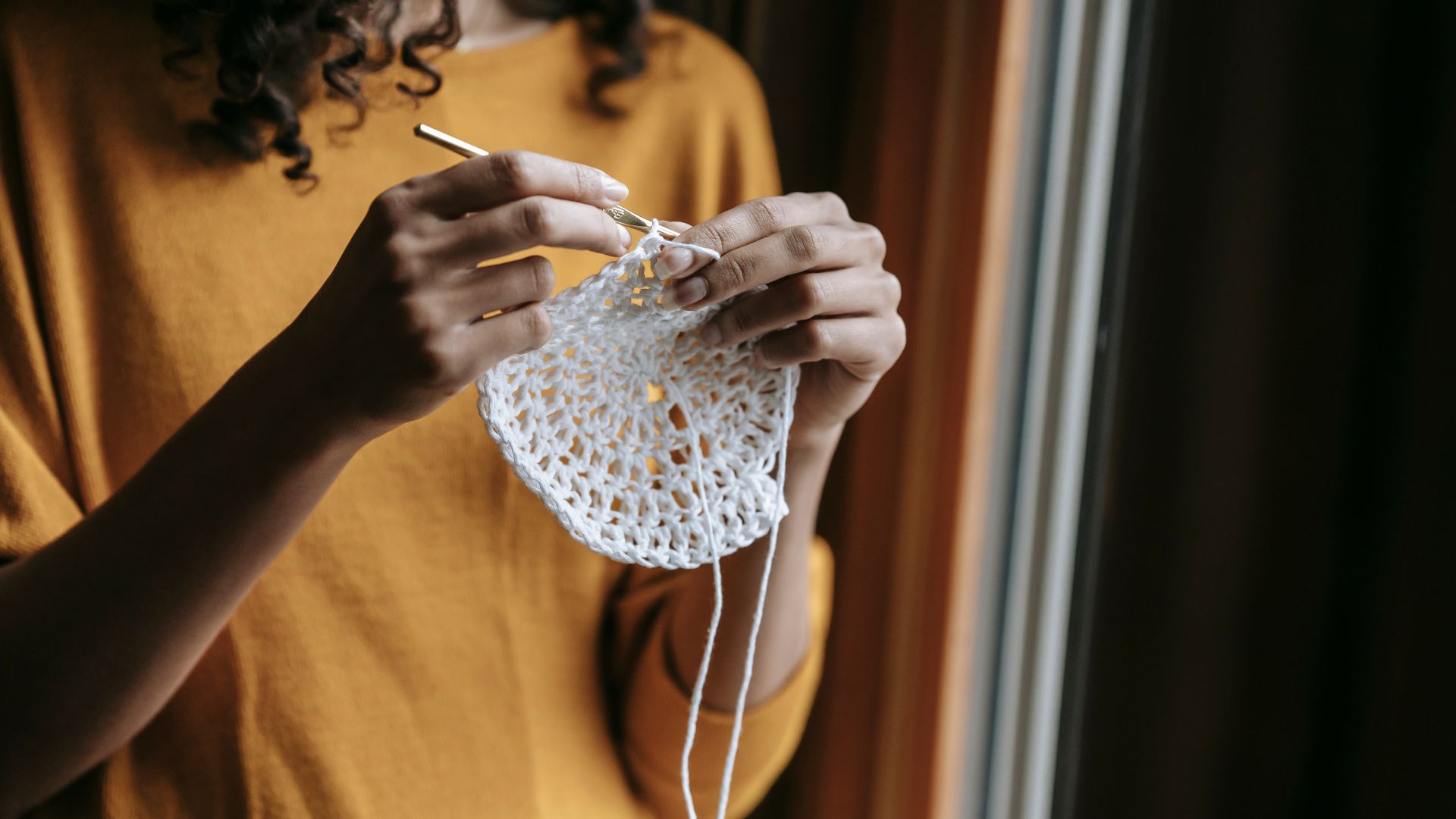In crochet, weaving in ends is the final touch that brings a project together. Those seemingly pesky yarn tails play a crucial role in ensuring your masterpiece stays intact and polished. Let’s unravel the mystery behind this essential step.
Understanding Why Weave in Ends?
Securing Yarn Tails
Weaving in ends prevents unraveling, ensuring your hard work stays intact over time.
Aesthetics and Neatness
Tucking away yarn tails creates a clean, professional finish, enhancing the overall appearance of your project.
Longevity of Your Creation
Properly woven ends contribute to the durability and longevity of your crocheted piece, maintaining its beauty through wear and tear.
How to Weave in Ends Like a Pro
1. Choose the Right Tools
Utilize a yarn needle or a crochet hook with a blunt end to weave in ends seamlessly.
2. Weave As You Go
Integrate weaving in ends into your crochet process by working over the tails as you crochet. This method reduces the number of tails to weave in at the end.

3. Thread the Yarn Needle
Thread the yarn tail onto the needle, ensuring it’s secure and won’t unravel while weaving.
4. Sew Along the Stitches
Weave the tail through the stitches on the wrong side of your work. For rows, weave horizontally; for rounds, weave in a circular motion.
5. Change Directions
To prevent the tail from slipping out, change directions when weaving. Go back through the stitches in the opposite direction for a few inches.
6. Trim Excess Yarn
Once the tail is adequately woven, trim the excess yarn close to the fabric without cutting the stitches.
Embrace the Finishing Touch
Weaving in ends might seem like a mundane task, but it’s a crucial step that elevates your crochet projects from good to exceptional. Embrace it as a meditative process that adds value to your craft.
External Resources for Further Learning:
- Craftsy – How to Weave in Ends Like a Pro
- The Spruce Crafts – Finishing Touches: Weaving in Ends
- LoveCrafts – Weaving in Ends Tutorial
With every yarn tail you weave in, you’re not just finishing a project; you’re leaving your mark as a meticulous and skilled crocheter.
Advanced Techniques for Seamless End Weaving
As you progress in your crochet journey, refining your weaving-in ends technique becomes pivotal, especially when working on intricate patterns or multi-colored projects. Let’s explore advanced methods to elevate your finishing game.
Duplicate Stitch Method
For color changes or when working with contrasting yarn, use the duplicate stitch method. Thread the yarn tail through a yarn needle and replicate the nearby stitches, camouflaging the tail within the design.
Integrate While Crocheting
When working with multiple colors or joining motifs, incorporate the new yarn by crocheting over the old tail. This technique seamlessly integrates the yarn tail into the stitches, reducing the need for additional weaving.
Invisible Join Technique
For seamless joins in rounds or circles, use the invisible join method. Weave the tail through neighboring stitches using a yarn needle, creating an imperceptible transition between rounds.
Troubleshooting Weaving Challenges
Slippery Yarns
For slippery or silky yarns that tend to unravel, weave in the ends more generously and secure them with a knot (if appropriate for the project).
Bulky Yarns
With bulkier yarns, utilize a larger yarn needle to weave in the ends more comfortably through the thicker stitches.
Complex Patterns
In complex or lace-like patterns, weave the ends through similar-colored stitches to ensure they remain hidden within the design.
External Resources for Advanced Techniques:
- Interweave – Advanced Techniques for Weaving in Ends
- YouTube Tutorial: Advanced End Weaving Methods
- Ravelry Forums – Tips from Crochet Community
Embrace the Final Flourish
Mastering the art of weaving in ends isn’t just about securing yarn tails; it’s a testament to your attention to detail and dedication to impeccable craftsmanship. Embrace these advanced techniques as tools to finesse your projects, and let your creations shine with flawless finishing touches.
So, whether you’re seamlessly integrating colors or flawlessly hiding tails in intricate designs, remember that the artistry of weaving in ends is the perfect culmination of your crochet masterpiece. Happy crocheting, and may your endings be as splendid as your beginnings.
Perfecting Your End Weaving Skills: Expert Tips
Refining your expertise in weaving in ends is a journey marked by attention to detail and commitment to excellence. As you tread this path, consider these expert tips and a few parting thoughts to elevate your finishing touches.
Expert Tips for End Weaving Mastery
- Consistency is Key: Maintain a consistent tension while weaving in ends to ensure uniformity across your project.
- Check from Both Sides: Periodically flip your work to inspect the right and wrong sides, ensuring tails are properly hidden.
- Secure Ends in Critical Areas: In high-stress points, like garment seams or areas prone to stretching, secure ends with an extra knot for added durability.
- Block and Trim: After weaving, block your finished piece to set stitches and then trim any remaining tails for a flawless look.
Parting Words of Wisdom
Weaving in ends is not just a technicality; it’s a testament to your dedication to your craft. Each woven tail represents your commitment to creating enduring, beautiful crochet pieces. Embrace this final step as a canvas for your creativity and precision.
External Resources for Expert Insight:
- Crochet Insider – Perfecting End Weaving Techniques
- LoveCrafts Community – Tips from Experienced Crafters
- Reddit Crochet Community – Expert Advice and Insights
In Conclusion
Weaving in ends might seem like a small detail, but it’s an integral part of achieving a professional finish in crochet. Embrace this final act of craftsmanship with patience and precision, knowing that each woven tail contributes to the beauty and longevity of your creations.
As you hone your skills and incorporate expert techniques, may your crochet journey be filled with satisfaction, creativity, and beautifully finished masterpieces.
Comparison tabular on this
| Aspect | Beginner Level | Intermediate Level | Advanced Level |
|---|---|---|---|
| Definition | Basic weaving to prevent unraveling | Integration while crocheting, basic color changes | Advanced colorwork, seamless transitions |
| Common Challenges | Tails unraveling, visible ends | Managing multiple colors, bulky yarns | Intricate patterns, seamless joins |
| Approach | Basic weaving through stitches | Incorporating tails while crocheting, duplicate stitch | Invisible joins, complex pattern integration |
| Tools | Yarn needle, basic yarns | Blunt-end needle, multiple yarns | Specialized needles, delicate yarns |
| Benefits | Securing ends, neat finish | Seamlessness, reduced need for additional weaving | Professional finish, flawless transitions |
| Learning Curve | Moderate, basic technique development | Gradual, improved integration techniques | Advanced, intricate pattern comprehension |
| Expert Tips | Consistent tension, inspect both sides | Secure knots, extra checks at critical areas | Seamless transitions, advanced blocking |
This comparison showcases how end weaving evolves from a fundamental skill to more advanced techniques, culminating in seamless finishes and intricate pattern integration.
Wrapping up
In the colorful world of crochet, mastering the art of weaving in ends isn’t just about tidying up loose threads; it’s the final stroke that transforms a project into a masterpiece. Whether you’re a novice, an intermediate crafter, or an advanced artisan, weaving in ends is a journey of growth, precision, and creativity.
Embrace the process with patience and attention to detail. Every yarn tail woven signifies your dedication to excellence and the pursuit of perfection in your craft. As you progress, incorporate expert techniques, and refine your skills, remember that each finished piece tells a story of your craftsmanship.

For over a decade, I’ve been Mike, an artist, crafter, and designer deeply immersed in the Croc world. I thrive on crafting unique, size-inclusive patterns, fostering creativity, and sharing them on ktforum.com. My designs aim to ignite your creative spark and delight you, ensuring clarity and ease of use through rigorous testing. Join me in expressing your creative flair and showcasing your craft with joy.
Related Posts
- The Art of Crochet: A Beginner's Guide
Crochet is a beautiful and versatile craft that allows you to create stunning textiles…
- Mastering Color Changes in Crochet: A Comprehensive Guide
Crochet is an incredible craft that allows you to create beautiful, intricate designs using yarn…
- Using Different Hook Sizes in Crochet Projects: A Complete Guide
Crocheting offers a delightful avenue for creativity, and the choice of hook size can significantly…
- Unveiling the Beauty of Tunisian Crochet: A Complete Guide
Tunisian crochet, often hailed as a captivating fusion of knitting and traditional crochet, is a…

